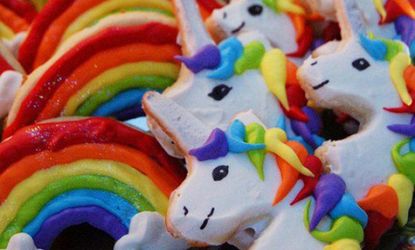Rainbows and unicorns: A linguistic history
It all seems to date back to a 19th-century French book

It's not all rainbows and butterflies, you know. Or rainbows and unicorns. Or butterflies and unicorns. But when it comes to referring to impossibly perfect conditions where everyone's happy and nothing goes wrong, we're living in a golden age of RBUs.
A Google News search for just the past week brings up almost 500 hits for rainbows and unicorns or rainbows and butterflies. On this Google Ngram Viewer graph below, you can see that both expressions, as well as butterflies and rainbows, are on the rise, with rainbows and unicorns in particular shooting steadily up since 2003.

Rainbows and butterflies came together first. The earliest attestation I've found is from an 1864 book by Jenny d' Héricourt (translated from French) titled A Woman's Philosophy of Woman, where on pages 191 and 192 we read:
Subscribe to The Week
Escape your echo chamber. Get the facts behind the news, plus analysis from multiple perspectives.

Sign up for The Week's Free Newsletters
From our morning news briefing to a weekly Good News Newsletter, get the best of The Week delivered directly to your inbox.
From our morning news briefing to a weekly Good News Newsletter, get the best of The Week delivered directly to your inbox.
...if [women] were free and happy they would be less eager for illusions and cajoleries and it would no longer be necessary in writing to them to place rainbows and butterflies' wings under contribution…
It's butterfly wings instead of entire butterflies, but the sentiment seems the same. The phrase also occurs in William S. Lord's 1897 poem Jingle and Jangle, which lists some things that the pleasant sound of a jingling bell brings to mind:
Sunshine and sugar and honey and beesRainbows and butterflies wings,Bird songs and brook songs and wide spreading trees,Of joy little Jingle bell sings.
Butterflies and rainbows also appears in the late 19th century, in an 1896 editorial that scornfully refers to the idea of moving the U.S. to a dual gold-and-silver standard as "chasing free silver butterflies and rainbows."
Pairings of rainbows with butterflies (not just butterflies' wings) continue to appear on into the 20th century, often as the objects of chasing, before the steady rise in the graph that began in the 1970s. Since then, "rainbows and butterflies" has been the title of a 1983 song by Billy Swan, the title of two books of poetry, and part of the lyrics of Maroon 5's 2005 song "She Will Be Loved."
In the 1980s, unicorns made their entry, at around the same time that Hasbro began marketing its My Little Pony line of toys, which included both a Rainbow Ponies and a Unicorn Ponies collection. However, I can't claim that this event was the you-got-your-chocolate-in-my-peanut-butter moment for rainbows and unicorns; it may be that an increasing popularity of unicorns was responsible for both phenomena. A 2010 post on the Zandl Marketing Group's blog puts the increasing popularity of rainbows and unicorns in the context of the mainstreaming of gay cultural symbols. In any case, in the mid-80s we begin to see examples like this one from 1984:
Sign up for Today's Best Articles in your inbox
A free daily email with the biggest news stories of the day – and the best features from TheWeek.com
The only calendars left in the stores just before the holidays are those with unicorns and rainbows on them. [Orange Coast Magazine]
Although unicorns arrived late to the party, they've hit it off so well with rainbows that for some, it's not enough just to have the two words conjoined by and. In the past few years, unicorns that fart rainbows seem to have become their own meme. For an even tighter linkage, there's Lady Rainicorn, a half-rainbow, half-unicorn character in Cartoon Network's Adventure Time series.
These days, unicorns sometimes get together with butterflies to the exclusion of rainbows. There aren't enough examples to have been captured in the Google Ngram corpus, but Google Books has a 1996 example of butterflies and unicorns in Skywriting, by Margarita Engle:
I would take the alligators out of its rivers and the scorpions out of its soil, replacing them with butterflies and unicorns.
In the other order, "Unicorns and Butterflies" is the name of not one but two blogs, each begun sometime in the last two years.
Some people prefer not to choose between unicorns and butterflies with their rainbows. The "Rainbows and Butterflies and Unicorns" Facebook page doesn't. And in the 2008 movie Horton Hears a Who, a child character takes that earlier scatological unicorn-rainbow connection, reverses its direction, and brings in the butterflies, telling of an imaginary world where "there are unicorns who eat rainbows and poop butterflies!"
Other words to appear in RBU contexts include smiles, sunshine, balloons, bunnies, kittens, and lollipops. In a 1981 monologue, Steve Martin declares that he believes in "rainbows and puppy dogs and fairy tales." Three-syllable nouns, it seems, tend to be favored for rainbow collocations; specifically, three-syllable nouns consisting of an unstressed syllable sandwiched between two stressed syllables: BUTTerflies, Unicorns, LOLlipops, PUPpydogs, FAIRy tales. This kind of three-syllable string is known in poetry circles as a cretic.
So if you'd like to enrich the language with some new rainbow-cretic collocations, I offer my suggestion: Rainbows and boogeymen and heart attacks.
Create an account with the same email registered to your subscription to unlock access.
Neal Whitman is a columnist for the online resource Visual Thesaurus, and an occasional guest writer for the podcast "Grammar Girl's Quick and Dirty Tips for Better Writing." He teaches ESL composition at The Ohio State University, and blogs at Literal-Minded, where he writes about linguistics from the point of view of a husband and father.
-
 Death Cafe: where people talk mortality over tea and cake
Death Cafe: where people talk mortality over tea and cakeWhy everyone's talking about The meet-ups offer a judgement-free and respectful space to discuss the end of life
By Chas Newkey-Burden, The Week UK Published
-
 Mark Menzies: Tories investigate MP after 'bad people' cash claims
Mark Menzies: Tories investigate MP after 'bad people' cash claimsSpeed Read Fylde MP will sit as an independent while party looks into allegations he misused campaign funds on medical expenses and blackmail pay-out
By Arion McNicoll, The Week UK Published
-
 'Another day of chaos in DC'
'Another day of chaos in DC'Today's Newspapers A roundup of the headlines from the US front pages
By The Week Staff Published